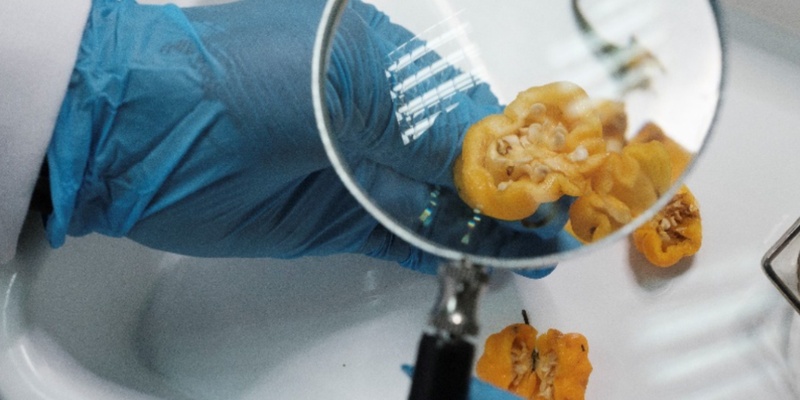Annual IPPC Regional workshops commence
Posted on Tue, 06 Aug 2024, 09:25

© FAO/Eduardo Soteras A laboratory technician inspects vegetables in a laboratory at a border post. Discussions on developing and implementing plant health standards are top of the IPPC regional workshops agenda.
Rabat, 5 August 2024.. The first of this year’s annual regional workshops of the International Plant Protection Convention (IPPC) is being held this week, for the Near East and North Africa region. More workshops will be held in August and September for Africa, Asia, the Caribbean, Europe and Central Asia, Latin America and Southwest Pacific regions. The IPPC regional workshops provide a platform for plant health communities in specific regions of the world to discuss phytosanitary matters and contribute to developing plant health standards and implementation and capacity development resources. The theme for this year's workshops is " Plant health, safe trade, and digital technology".
The IPPC Secretariat organizes the annual regional workshops in collaboration with regional plant protection organizations (RPPOs) and the Food and Agriculture Organization of the United Nations (FAO) regional and sub-regional offices. Participants include phytosanitary specialists from national plant protection organizations, regional plant protection organizations, institutions focusing on plant health, FAO, and the IPPC Secretariat. The regional workshops are also attended by members of the IPPC's Commission on Phytosanitary Measures (CPM) Bureau and its Standards (SC) and Implement and Capacity Development (IC) committees.
Osama El-Lissy, IPPC Secretary, thanked the countries that are hosting this year’s IPPC workshops and underscored the importance of regional collaboration and coordination in the global fight against pests.
“Pests do not respect geographic borders, and this is why regional cooperation is fundamental. The IPPC community is strongest and best able to make a lasting impact through the dedication of its RPPOs, contracting parties, partners, and donors,” he added.
During the workshops, participants receive updates on IPPC governance and strategic issues and discuss challenges and strategies to advance plant health, such as the draft International Standards for Phytosanitary Measures (ISPMs), using digital technology for pest monitoring and safe trade, as well as topics of interest to regions. For the NENA region, for instance, discussion topics include management strategies for red palm weevil, building capacities for pest surveillance, controlling Cactus Cochineal, and building resilient systems through phytosanitary capacity evaluation (PCE). Anchored in the IPPC Strategic Framework 2020-2030, other issues to be discussed include the IPPC’s work on climate change and plant health, preventing pest spread through e-commerce and countries’ adoption of the IPPC ePhyto Solution for electronic phytosanitary certification of traded agricultural goods.
The regional workshops also include technical field visits to sites of selected plant health interventions such as pest monitoring fields and diagnostic laboratories, to facilitate experience sharing among participants.
Considering that the world loses 40 percent of its annual crop yield to pests, El-Lissy noted that the work of RPPOs can positively influence crop productivity and trade, especially through the adoption of harmonized phytosanitary standards and regional cooperation in plant health matters.
“We rely on your subject matter expertise and continued dedication to pursue the IPPC mission to protect global plant resources and facilitate safe trade”, he said.
Below is the schedule for the 2024 IPPC regional workshops:
| Date and location | Region |
|---|---|
| 1. 5-9 August - Rabat, Morocco | Near East and North Africa |
| 2. 19-23 August - Nadi, Fiji | Southwest Pacific |
| 3. 20-23 August - Managua, Nicaragua | Latin America |
| 4. 20-23 August - Kinshasa, Democratic Republic of Congo | Africa |
| 5. 26-30 August - Trinidad and Tobago | Caribbean |
| 6. 2-4 September - Yerevan, Armenia | Europe and Central Asia |
| 7. 4-8 September - Seoul, Korea | Asia |
Related information

